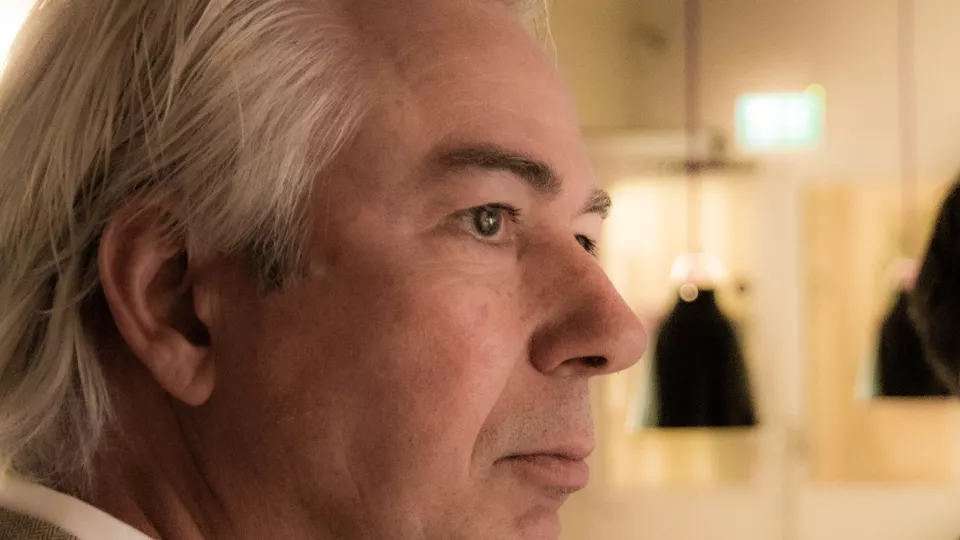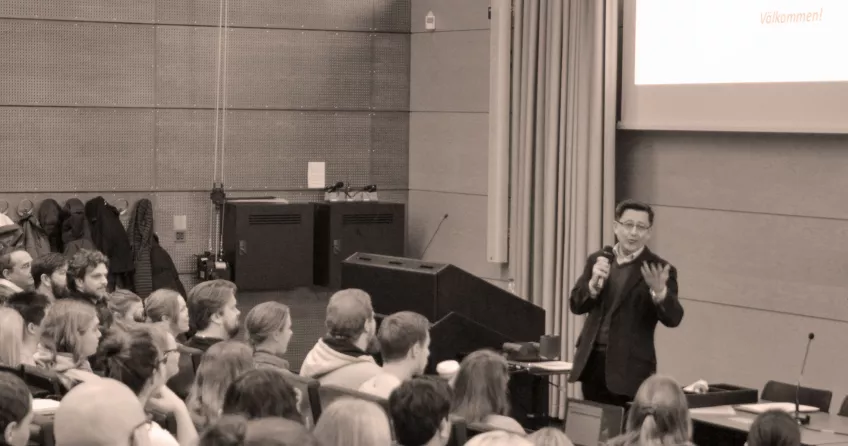Accompanied by his partner and two dogs in their rural home outside of Lund, Matthias Baier spent the spring semester phasing himself out of the department's top managerial position and back to being a lecturer. "It has been a lot of fun," he says about examining and supervising students at the bachelor level.
He also spent more time on research, primarily in the department's most comprehensive project, Central Asian Law, which aims to inform European investors and decision-makers on the legal cultures of Central Asia and how the business climate can be improved.
"And occasionally, I have tried to do nothing at all. I feel I have reasons for that."
He estimates the administrative workload doubled during his decade as department head - the administrative systems amounting to about 20 by the end - which is one of the reasons he tired of the job. Another was that he had held the position for too long. It is customary for the Head of Department to do one or two three-year terms, but not against regulations to stay longer. The issue was institutionalization.
Seven or eight years in, his thinking became rigid. He was doing things on routine. It was time to quit. Yet, he accepted the nomination for another mandate period, unsure if anyone else wanted to do it. "That was a bad sign," he says. "I was stressed by the idea that I couldn't so easily step down. At that point, colleagues with an outside perspective recommended I quit. It is not good when things are in the hands of one person for that long."
"I am super happy that Isabel has committed to do this. The transition has gone really well."
READ: Isabel Schoultz on being Head of Department
Baier's concern for the Sociology of Law Department is not surprising. During his tenure as prefect, he reached most of his goals and helped to stabilize the department.
In the late 1980s, the Sociology of Law Department needed a new professor. The appointment fell on a senior lecturer at the department, but some found the selection controversial and appealed the decision. A long, resource-draining process followed, along with a string of interpersonal conflicts. The Faculty of Social Sciences tried to solve the problems by downgrading the department to a unit and incorporating it in the Sociology Department.
Baier was concerned about the working environment partly influenced by internal strife. He had felt intellectually out of place at the Uppsala University Faculty of Law and wanted to come to Lund. "I really thrived at the Sociology of Law unit and felt I had finally found my way home." Now he was concerned about the unit's future at the university. "We are the only sociology of law institution in Sweden. We were small at the time and in what felt like a precarious situation. I wanted all of us had to work towards maintaining the unit, make it functional and stable, and grow enough to be able to do what we wanted to do at this big university."
Despite internal conflicts, the Sociology of Law unit progressed considerably in the 2000s. In 2006, the Faculty Board separated it from the Sociology Department and made it a freestanding division. When the position as Head of Division opened up in 2009, Baier was drawn to the possibility of improving the organization and accepted the nomination. Shortly after being elected, he set up three overarching objectives.
Workplace surveys were still showing considerable dissatisfaction among staff members. After an external investigation, the department began working to change the culture. New recruitments were an important aspect in the cultural shift, as well as non-academic activities bringing the department together. There was an active office choir at one point and an amateur indoor football team.
In addition to improving the social working conditions, he saw it vital to rein in the economy. "I thought that if we focused on these issues, the quality of our work would, not improve automatically, but we wouldn't have to compromise the quality of our education and research due to economic incentives," Baier says. "And if people are happy at work they will write better articles, better applications, and do better as lecturers."
The division had struggled with a growing budget deficit stemming from decreased educational appropriations while compelled to keep staff. Saving in on pencils and erasers would not cut it. Baier and the newly recruited economist Sofie Magnusson created five-year plans, drew up economic prognoses, and adopted an economically holistic approach.
His third objective was to rejuvenate the highest academic segment. The division's three professors Karsten Åström, Per Wickenberg, and Håkan Hydén were about to retire. Their replacement had to be someone whose appointment would not trigger appeals or exacerbate conflicts.
In 2013, the economy had stabilized, and the mood at the division was improving. In September, the Faculty decided to upgrade the division and institute the Sociology of Law Department. A few months later, Reza Banakar left his tenure at the University of Westminster and returned to the institution where he defended his doctoral thesis almost 20 years earlier – now as the department's new professor.
"That is the fun part about being the Head of Department, getting to know people well and contributing to putting a person in a position where they do a good job," Baier says. "It balances out working with all the tedious administrative systems."
Baier is consistent in praising his colleagues for their academic work and efforts to work together. His only regret is that he did not manage to ensure that there are more of them. "Every now and then, there's a trend of merging departments and, I don't think we want that. The only protection against that is to be too big to be merged."
Before retiring in five to seven years, Baier wants to spend the dedicated research hours he accumulated during his years as department head. He has no interest in hanging around the university after retirement and would rather spend time with his partner training their two dogs. "Working with dogs is different. It doesn't help if you draft policies for how they should behave, they won't do it anyway."
Before ending our conversation, Baier brings up one of the main assets during his eleven years as Head of Department. "It's been great getting to know all the other Heads of Department at the Faculty. Discussing issues with them have been immensely supportive. Nowhere in the job description does it say that the position comes with such a great resource."



